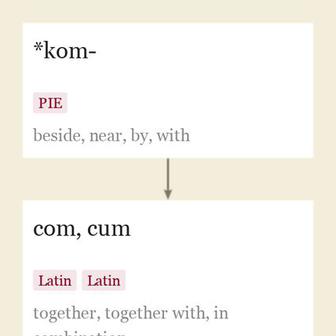cum
动词(“射精”)和名词(“精液”),于1973年出现,显然是 come 的变体,起源于色情写作,可能最初出现在名词中。这个 come 的“体验性高潮”俚语意义(可能最初是 come off)可以追溯到1650年,在主教珀西收集的“散歌”手稿中的“Walking In A Meadowe Greene”中出现。
They lay soe close together,
they made me much to wonder;
I knew not which was wether,
vntill I saw her vnder.
then off he came & blusht for shame
soe soone that he had endit;
yet still shee lyes, & to him cryes,
"Once More, & none can mend it."
他们紧紧地躺在一起,
让我感到很惊讶;
我不知道哪个是公羊,
直到我看到她在下面。
然后他射了出来,羞愧得发红了脸,
这么快就结束了;
然而她仍然躺着,对他喊叫着,
“再来一次,没有人能超越它。”
它可能更古老,隐藏在双关语中,例如“我来了,我来了,甜蜜的死亡,摇摇我入睡!”[“Nashe His Dildo”,1590年代]
作为一个名词,意思是“精液或其他高潮产物”, come 可以追溯到20世纪20年代。
性爱的 cum 似乎与拉丁语的 cum 没有关系,后者是介词,意思是“与,连同,与……有关”(com 的一种古老形式; 参见 com-),英语有时在合并教区或福利名称中使用它(例如 Chorlton-cum-Hardy),在流行的拉丁短语中使用它(例如 cum laude),或者作为一个组合词来表示双重性质或功能(例如 slumber party-cum-bloodbath)。
最早记录年份: 1973
